#Akrisios Akrisios
Text
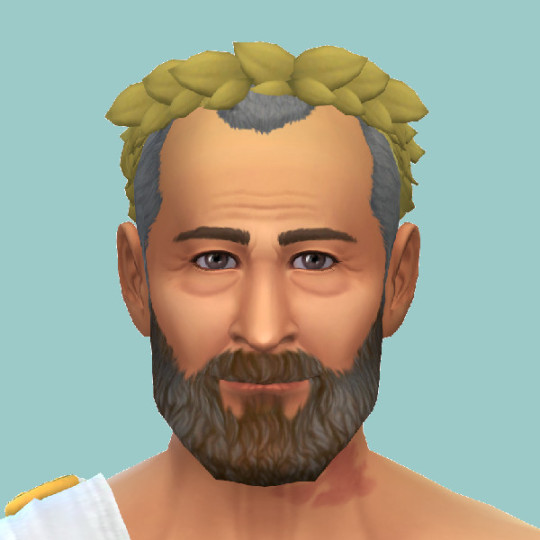
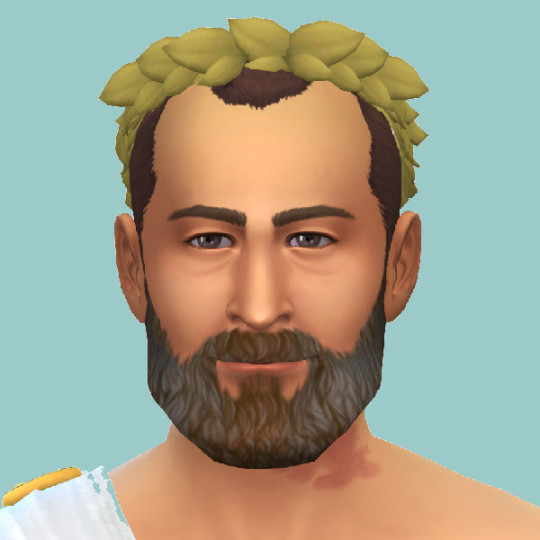

King Akrisios I
GENDER - Male
AGE - Elder
King of Selinódasos
ASPIRATION - Mansion Baron
TRAITS: Bookworm, Language Savant, Slob
SIGN: Leo
PARENTS - unknown
PARTNER - Laonome Amphytriona, Bisera Akrisiou,
CHILDREN - Euthalia, Nikh, Philokratis, Monachos
Download: Not available
Story: Once Upon A Time - The first ones
Family tree: The first ones
He is King in a very small kingdom, and he is a relaxed and intellectual monarch. He enjoys debating and small talk, something that absolutely is an advantage when you are royalty.
He is a practical man, and when his wife Laonome died it didn't take him long to find a new wife. For his children's sake, he claimed.
#Story character#King Akrisios#Generation 2#side character#Once Upon A Time#Akrisios Akrisios#Royal family of Selinódasos#King of Selinódasos#Early Civilization#KyriaT
0 notes
Text
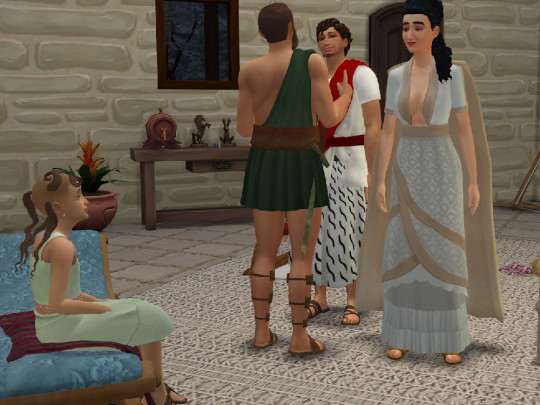

The King of Manthos, the young Mijararos, had payed a friendly visit to King of Selinódasos, the wealthy King Akrísios, who was also married to Mijaros' aunt, Queen Laonome. This was a courtesy visit, but with an agenda. They had an important issue to discuss: To strengthen the ties between the two kingdoms through an agreement on marriage.
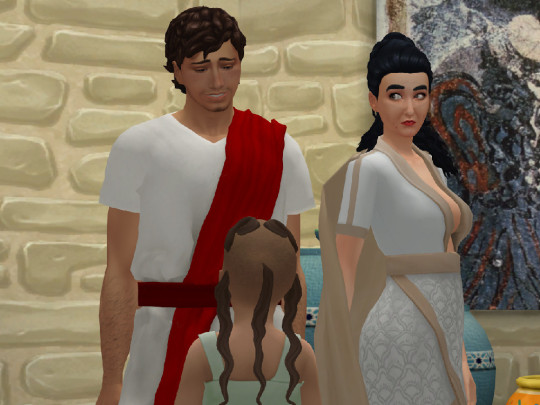
When seeing his potential wife, King Mijararos was quite startled.
- But she is still a child! I don't think this is a good idea.
- Well, you knew her age already, didn't you? She is almost ten winters.
- When grandmother said "marry your cousin" I didn't realize she meant Princess Nikh. I always assumed she meant Princess Euthalia. This is not what I had prepared for.
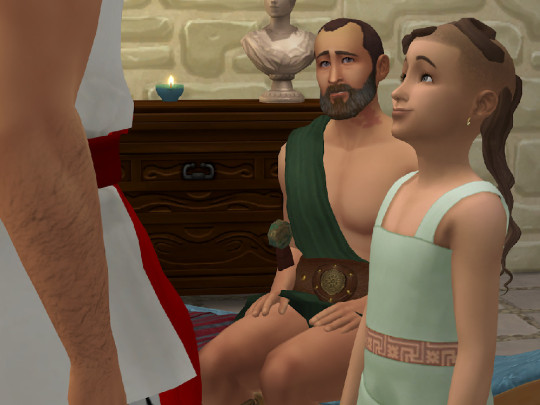
- Princess Euthalia is already spoken for. We have already made an agreement with the Kingdom of Koiláda Chalkoú.
- I don't mind cousin Mijarare, Nikh said, I know you will be a kind husband. And also grandma and uncle Heraklis will be there, so I'm not afraid.
- Thank you for that, Nikh my dear, but it's not that easy. There are expectations that you simply can't fill.

- There would be a long period of engagement of course, at least three winters. The important thing now is the agreement, not the fulfillment.

- I hear you uncle, and I respect that, but I ... I just can't. The age difference bothers me, and it will probably do so for many years. The gap is too large. I'm sorry, I will just have to decline.
- Mother will not be pleased, Laonome said. The whole family will be so disappointed.
- It can't be helped aunt Laonome, this is impossible. I will have to look for a wife elsewhere I'm afraid.

- Is it my fault cousin Mijarare? Am I too ugly? You don't love me?
- Of course I love you! Just not in a husband-and-wife-way, okay? Besides, you are the prettiest girl in the whole kingdom and any young man will be proud to marry you, as soon as you get a bit older.
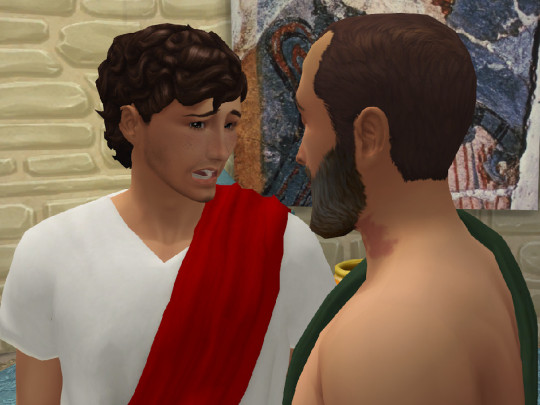
- I'm really sorry uncle. But might I suggest that you consider my brother Linos for Nikh? They are closer in age, and he is second to the throne.
- I was hoping for a more prestigious marriage, so I don't know. It's not what I had planned for my daughter. This is most unfortunate.
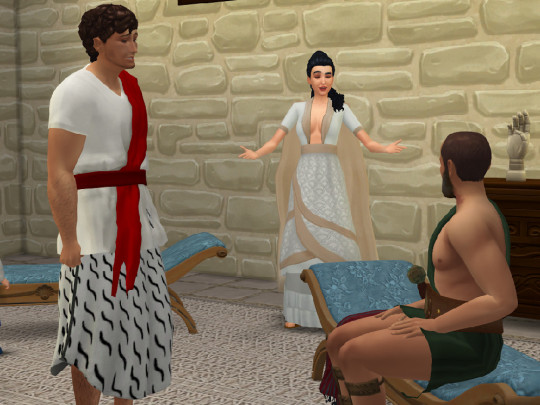
- My men! Laonome cut in. We must be able to solve this somehow.
- I don't see how, Mijararos answered.
- Not me neither, Akrisios agreed.
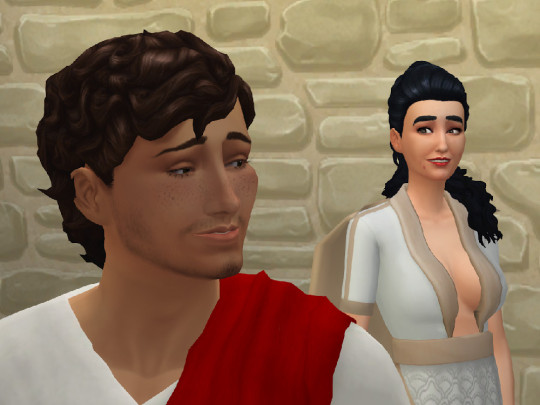
- Dear nephew, would you consider marrying Euthalia, if she wasn't spoken for?
- I would. We are about the same age at least.
- So if we can reach an agreement with the King of Koiláda Chalkoú to let her go, would we have an agreement? Even if the dowry would be lower?
- Why should it be lower?
- Because we would have to offer something to the King of Koiláda Chalkoú. As a compensation.
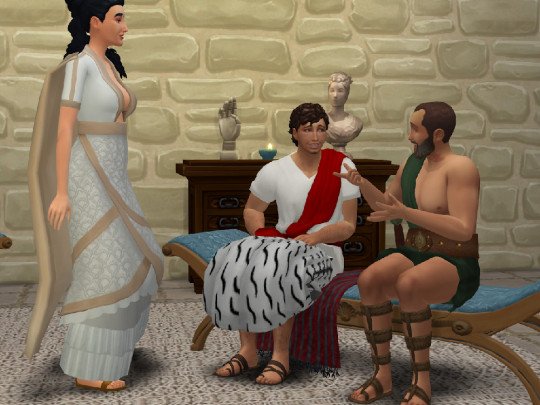
- Do you think he would be willing to discuss it?
- It's worth a try.
- And Euthalia, how would she feel about it, would she consider living at Manthos palace?
- Oh, absolutely. She wasn't very keen on going to Koiláda Chalkoú, that's for sure. She's been sulking for weeks now.
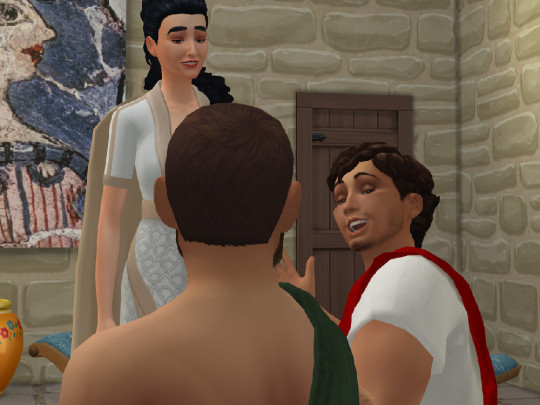
- Ironically, that sounds promising. So maybe we have an agreement then?
- Provided the King of Koiláda Chalkoú agrees; yes!
- When I come home, Mijararos added, I will suggest that the house of Manthos and grandmother assists with the compensation, just to make sure he will think it's worth it.

- You make it sound so easy, Laonome laughed.
- What?
- "I will suggest that grandmother assists". That woman is not known for accepting any suggestions easily. Unless it's in her interest.
- It's just a matter of making her realizing just that, it is in her interest. I know what I will have to do.
.
Previous (Chapter 10) | Index | Character overview | Next
#KyriaT#KyriaT-stories#Chapter Eleven#ts4 story#sims 4 story#history challenge#ts4 history challenge#Generation 2#Early civilization sims#Early civ sims#Once Upon A Time#The First Ones#King Mijararos#Queen Laonome#King Akrisios#Princess Nikh#simblr
19 notes
·
View notes
Text
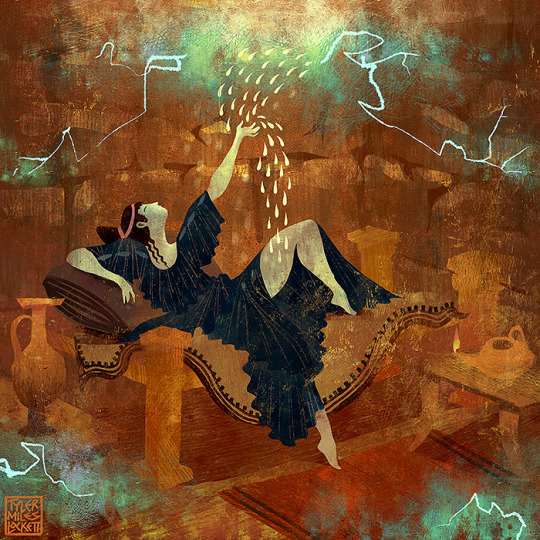
The Seduction of Danae, (#1 in my "Quest for the Gorgon Head" series)
King Akrisios of Argos receives an ominous warning from the oracle that his daughter, Danae, will give birth to a child that will slay the king. These pesky father slaying prophecies pop up again and again in Greek myth; Cronus being overthrown by his son (Zeus) and Zeus in turn being overthrown by his offspring with Metis.
So what does our King Akriosis do with his daughter? Well, he imprisons her into an underground Bronze chamber of course! keeping her and her womb far from any pesky suitor's libidos. But Zeus, visits Danae, and morphs into a gaseous cloud, penetrating into the cracks of the chamber, seducing Danae with warmth and wonder, pouring his favor upon her in the form of a golden rain. The symbolism is clear here, as rain fertilizing crops is standard symbolism for intercourse in Greek erotic poetry.
There is much debate through a modern lens at Zeus's conquests; is he raping or seducing? Well, He, and many other gods, do both. In certain tales, they seduce the willing, and in others, they rape the unwilling. With Danae, it was left open to my artistic interpretation. I decided that Danae, having been chained in a bronze dungeon cell by her own father, in her isolation and confinement, welcomes the deity and a child into her womb as a miracle. But when Danae gives birth to her son, a little boy she names Perseus, the King has a cruel plan for them both.
Like this art? It will be in my illustrated book with over 130 other full page illustrations coming in June to kickstarter. to get unseen free hi-hes art subscribe to my email newsletter
Follow my backerkit kickstarter notification page.
Thank you for supporting independent artists! 🤘❤️🏛😁
#greekmythology#greekgods#pjo#mythology#classics#classicscommunity#myths#ancientgreece#classicliterature#classicnovels#tylermileslockett
61 notes
·
View notes
Text
Because I'm incapable of seeing something that's shitty about Perseus without adding to my might-one-day-be Perseus fic, have some Polydektes;
Polydektes eyed his scribe, leaning forward and practically stabbing his hand towards the unfolded wax tablet in the man's hand.
"Well? What does it say?" He'd waited long enough for some upper hand, some way to proceed that didn't mean he'd have to do something so gauche as break into his brother's house with an armed contingent to escort his 'guest' out for her nuptials.
Guest, hah! Guesting anyone for nearly two decades by now would pale belief even among the most generous of hosts, and yet that was what his brother insisted the lovely Danae was, and what she insisted she was, nothing more, nothing less. And to be true, he did believe his brother hadn't made a concubine of the woman, despite that she was no less beautiful now than when she'd arrived on their island sixteen years ago. The woman was flawless, like a goddess among her mortal brethren, a single flower in an otherwise empty field of plain grass. She claimed she had a father who was alive and must be consulted before she married, yet refused to name him. Claimed she was a princess, and wouldn't willingly be made anyone's concubine, that it was an insult beyond life, and yet, again, she refused to name her supposed king - 'as long as my honourable and generous host is willing to keep me in his house'.
And his brother, his stupid, ridiculous, exhausting brother, had of course never wavered in his hospitality. His wife Clymene had, too, been frustratingly impeccable, apparently impervious to jealousy as well as bribery.
Now, none of that would matter any longer. Nearly three weeks ago, at the Festival of New Wine, he'd managed to approach his brother, Clymene, and the lovely Danae with her son without immediately being spotted, and overheard a most useful snatch of information. A clue to who Danae's father might be, as she'd spoken, with a quiet, aching sort of nostalgia that only made her lovelier and made him want to keep her so distracted in his bed her loveliness wouldn't yet be married by it, that she missed how Argos looked at this time of year. He'd been spotted moments later, pretending to no knowledge of what he'd overheard, but had sent a letter to the king of Argos only a couple days later.
If Danae was indeed the daughter of a king, and it was Argos she came from, unless she'd been married to the king of Argos but in that case he'd surely be directed to however her father was, he would now have what he needed to make Danae marry him. He was sure of it. The scribe cleared his throat, swallowing heavily as his gaze flicked between the tablet and Polydektes, finally bobbing his head.
"'My scepter bearing brother of Seriphos, greetings. Danae is indeed my daughter, born of my wife Eurydike and I, son of Abas. You have my permission to marry my daughter, taking your joy of her. The only bride price I would demand is that if she came to your island with a boy, who would have been about three years of age at the time, you have him killed, and kill any further sons you have by your new wife. The only reason I consigned my daughter to the elements to arrive at your island was due to an oracle, and I'm not about to risk it being fulfilled after it's finally being averted, by your gracious hand.' That's the end of the message, my lord."
Polydektes smiled, smacking the butt of the sceptre into the floor, ignoring his scribe and his pale-faced tension. The man was weak of stomach, but loyal.
Kill the boy?
Something he'd already been planning to do, though since Perseus had showed himself to be stronger than regular men when he'd been no more than twelve, the seemingly easy task had been decidedly more complicated since then. Being that strong, he was surely the son of a god - something which his grandfather had notably not mentioned. Perhaps Akrisios thought he would be weak enough to not dare such a deed, if he told the truth?
It couldn't be done simply, by mortals hands, even if they attempted to overwhelm the boy, definitely even stronger now just shy of twenty than he'd been at twelve, but there were other ways. Ways which would ensure the boy's father, if he was indeed a god, would have no reason to come after him, for it wasn't he who would have killed Perseus. And perhaps Perseus was just strong for no reason of divine ancestry, his grandfather putting child and mother in the chest that'd brought them to Serifos not for fear of the potentially divine father, but having enough conscience to not wish to kill kin directly.
It didn't matter. Whether Perseus' strength came from a divine father or merely blessed luck of human excellence, he'd take no chance. He'd simply find a way to trick the boy into some deed or another that'd be sure to kill him, and since he needed to plan for a wedding no matter what, he knew exactly how to go about it.
And if the old king of Argos thought he'd kill any sons he might get from the lovely Danae, he was gravely mistaken, whatever that oracle was. But then, what Akrisios wasn't told and wouldn't find out - until it was too late, if at all - wouldn't hurt him. Chuckling, Polydektes dismissed his scribe. Finally, this would be put to an end. Sixteen years after Danae's arrival, ten years of fruitless courting.
He'd show her what the place of a woman was, and she would come to enjoy it, for the life he could give her was no mean one. And she'd have new children, in time, to make up for the loss of her first one, ill-begotten as Perseus surely had been, no matter his father.
17 notes
·
View notes
Text
~~~~~Medusa~~~~~
~~~A Sea Deity~~~
~~Origin~~Ancient Greece
~~Dominion~~Wisdom, Feminine Blood Mysteries, Sexuality, Protecting.
~~Symbols~~Snakes, green, black & red, Hematite (Bloodstone).
~~Tarot Card~~Death, Queen of Swords
~~Workings~~Administer justice, protection, banishing, beauty, transformation, aiding in divination, awakening sexuality.
~~Other Titles~~Ruler of the Sea, The Ruler
~~Offerings~~Serpent figurines or images, snake skin, blood, red wine, coral ornaments (avoid buying real coral as it is endangered), sea water, sea salt, driftwood, green or black candles.
~~~Significant Dates~~~
~~Dark Moon: A potent time to tap into inner knowing.
~~Waning Moon: Associated with banishing and destruction.
~~Night Time / Darkness
~~~Medusa~~Who is she??~~~
A Serpent haired Gorgon whose gaze turned men to stone
Medusa was a Gorgon, a creature described as having a scaly head, protruding eyes and tusks. The introduction of the iconic serpentine hair wasn't introduced until much later. Medusa's parents descended from the primordial Greek earth Goddess Gaia, and Pontus, the personification of the sea. Phorkys, her father was called by ancient poet Homer 'The Old Man of the Sea' while her mother Keto was described as a sea monster. Their union produced monstrous triplets Stheno, Euryale and Medusa. These Gorgon sisters were hideous; to gaze upon them would petrify a person to death. The word Gorgon derives its meaning from the Greek word 'Gorgo', meaning 'grim one'. However, of these sisters Medusa was the only mortal. It could be inferred that Medusa's mortality gave her a human appearance in contrast to her frightening sisters. As we piece together the fragments of Greek mythology, we see discrepancies and variations like this. Ovid, the Roman writer described Medusa as a great beauty stripped of her charms in a vengeful curse from the Goddess Athena. He tells us that Medusa was raped by Poseidon at Athena's temple; in what seems an unreasonable act of retribution, Medusa is punished for the actions of another.
Although Medusa has a divine bloodline, she was not worshipped as a deity within Greek tradition but rather feared as a villain. Her main myth pertains to her death at the hands of Zeus's demigod son Perseus and is preserved in the writings of Homer and Ovid. In the ancient city of Argos, King Akrisios receives a prophecy that his death will be at the hands of the child birthed by his daughter Danae. The King tries to cheat his fate by locking Danae away so that she may never take a lover. No mortal prison can deter a God though, and Zeus soon enters Danae's chamber as a shower of gold. This unusual encounter leaves Danae pregnant. Unable to kill her, but happy to exile her to almost certain doom, King Akrisios locks Danae in a trunk and sends her adrift on the open water. Miraculously, mother and newborn son Perseus wash up alive and well on the shores of Seriphos where they are taken in by King Polydektes. Over the years, the relationship between Perseus and the King sours as Polydektes tries to force Danae to marry him. When the King eventually takes another to be his bride, Perseus promises the King the head of Medusa as a wedding gift. Goddess Athena, perhaps still holding a grudge against Medusa, aids Perseus on his quest. Athena explains that he must only look upon Medusa through a mirror, so that her gaze can't turn him to petrified stone. Perseus acquires an unbreakable sickle, Hades cap of invisibility, winged sandals and a shield polished to a mirror shine then sets off on his quest. Upon arrival, Perseus finds Medusa and her sisters slumbering in a jumble of bones and petrified bodies. Swiftly he decapitates the sleeping Gorgon and places her head in a sack. From her spilt blood, Pegasus the winged horse and Chrysaor are born, presumably fathered by Poseidon. Medusa's blood is said to have potent healing properties; Athena later gifts a vial of this blood to the healer Asclepius. Perseus carries Medusa's head with him, using it to turn his enemies to stone. Eventually he gives it to Athena, who places it upon her shield.
Alternative myths suggest that the once beautiful Medusa was a priestess of the virgin goddess Athena. Medusa was proud of her beauty, her flowing hair her most glorious feature. Poseidon, God of the Sea was enraptured by her, but she rejected all of his advances. Not to be denied, Poseidon took Medusa by force at the temple of Athena, desecrating a sacred place and robbing Medusa of her dignity. In anger, Athena punished Medusa by transforming her magnificent hair into living snakes. It seems unjust that Medusa paid the price for Poseidon's crime. However, some have reinterpreted the myth to infer that this curse was in fact a gift, intended so that Medusa would never be vulnerable again.
Medusa is strongly associated with the spiritual wisdom of serpentine energy, a recurring motif in human history. Dwelling in cracks and fissures beneath the earth, the snake is seen as an Underworld creature. A keeper of hidden knowledge, an emblem of creative and sexual energy. The shedding of its skin is a perfect metaphor for transformation and healing, stepping out of the old to emerge renewed and reborn. In this way, the serpent represents death as much as it symbolizes rebirth; its venomous fangs making it a fearsome predator.
In the myths of earlier cultures such as the Sumarian people of ancient Mesopotamia, the snake God Zu was a benevolent deity linked with fertility. Over time, the snake came to be vilified as evil and treacherous as can be seen with Eve's encounter in the Garden of Eden. This vilification can be viewed in Medusa's myth; punished for Poseidon's transgressions then hunted and beheaded as a trophy.
Coral was said to be the petrified blood of Medusa that had spilled into the sea
Greek myth portrayed the Goddess as the archetype of the 'devouring mother', a dark aspect of the feminine psyche that consumes and destroys. In spite of this, Medusa teaches us to own this shadow. No part of us should be denied, no matter how displeasing it may look at times, for it is necessary to have a fierce side if we are to protect our personal boundaries. If this dark aspect can be harnessed for empowerment and protection then it is valuable and worthy.
Medusa has experienced a revival as a patron of abuse survivors; she can be seen as a protectress of the vulnerable and called upon in defensive or banishment workings. She represents the unfairly demonized and avenges those who were denied justice.
Feminine sexuality, along with any sexuality not considered mainstream, has been repressed in the past, forced to conceal itself in shadow as something unsightly like the serpentine Goddess herself. For all that, Medusa encourages us to own our sexuality, to embrace the Kundalini energy so that we can release the creative, regenerative spirit that lies within us. She calls us to tap into our inner knowing, trusting the innate wisdom of our intuition. Medusa helps to heal our insecurities and embrace every aspect of ourselves. She asks us not to be afraid of disapproval, encouraging us to show our true face to the world.
~~~Devotion to Medusa~~~
Blessed is she with serpentine hair,
Immobilise foes with a deathly stare,
Your dark wisdom is misunderstood,
Embracing the shadow can be for the good,
Spirit of sea, the divine protector,
Beauty transformed to a frightening spectre,
Guardian to all that are shunned and rejected,
Returning the energy that's merely reflected.
Blessed Be!
3 notes
·
View notes
Text
Medusa ist, wie auch ihre Schwestern, Stheno und Euryale, eine der drei Gorgonen und eine Tochter der Meeresgötter Keto und Phorkys. Die Darstellungen der Gorgonen sind unterschiedlich. Allerdings werden sie meist als bösartige, geflügelte Jungfrauen mit Reißzähnen, ehernen Klauen und einem Gürtel aus Schlangen beschrieben. Medusa war die schönste Gorgone, wurde jedoch von der zornigen Göttin Athene verflucht. Seither trug sie Schlangen als Haare und versteinerte jeden, der sie erblickte.
Der Medusa-Mythos
Die Geschwister Keto und Phorkys zeugten gemeinsam drei Töchter, die Gorgonen. Eine davon war Medusa, die als einzige der drei Schwestern sterblicher Natur war. Ursprünglich galten die Gorgonen in altgriechischen Darstellungen als entstellt und missgebildet, wurden jedoch in der spätklassischen Zeit weiterentwickelt.
Danach wurde Medusa in der Regel als atemberaubende, betörende Schönheit dargestellt, in die sich sogar der Meeresgott Poseidon verguckte. Eines Tages beobachtete jedoch Athene eines der romantischen Zusammentreffen zwischen Medusa und Poseidon, worüber sie so sehr in Wut geriet, dass sie die Gorgo verfluchte und in ein Ungeheuer verwandelte.
Diese Verwandlung ist es, die wir auch heutzutage mit der Medusa verbinden: Schlangen, die anstatt Haaren ihren Kopf zieren, gefährliche Reißzähne, die aus ihrem Mund klaffen, eine Haut, die einem Schuppenpanzer gleicht und glühende, funkelnde Augen sowie eine Zunge, die ihr aus dem Maul hängt. Weiterhin wurde Medusa von diesem Zeitpunkt an verflucht, da kein Mann diesen Anblick ertragen konnte und augenblicklich zu Stein erstarrte, wenn ihn der Blick der Gorgo traf.

Perseus und Medusa
Perseus ist der Sohn von Zeus und Danaë. Er gehört zu den bekanntesten Helden der griechischen Mythologie. Danaë ist die Tochter des Königs Akrisios.
Diesem wurde prophezeit, dass ein Sohn seiner Tochter Danaë zum Verhängnis werden würde. Da diese durch eine Verbindung mit Zeus den Perseus gebar, versucht Akrisios, Perseus loszuwerden und sperrt Enkel und Tochter in eine Kiste, die er dem Meer übergibt. Allerdings werden sie mit Poseidons Hilfe gerettet und stranden auf der Insel Seriphos.
Dort angelangt, findet sie Diktys, ein Bruder des Königs Polydektes, und lässt sie bei sich wohnen. Allerdings beginnt alsbald der König, Danaë nachzustellen und um ihre Zuneigung zu buhlen, weshalb ihm Perseus, ihr ständiger Begleiter, ein Dorn im Auge ist. Er verlangt, dass er ihm das Haupt der Medusa bringe und hofft, dass Perseus scheitern und dem fürchterlichen Fluch der Gorgo zum Opfer fallen wird.
Allerdings bekommt Athene Wind von diesem Vorhaben, die seit der Verwandlung der Gorgo mit dieser verfeindet ist und unterstützt Perseus bei seiner Aufgabe. Sie überlässt ihm ein glänzendes Schild, das es ermöglicht, jemanden nur durch das Spiegelbild zu betrachten. Demnach zeigt Athene ihm eine Möglichkeit, der Medusa ins Gesicht zu schauen, ohne sofort zu Stein zu erstarren.
Perseus und die Graien
Weiterhin gab sie ihm den Rat, sich zu den Graien zu begeben, die ihm den Aufenthaltsort der Medusa verraten könnten. Die Graien, auch die Gräulichen genannt, waren die Schwestern der Gorgonen. Der Bruder Athenes, Hermes, rüstete Perseus außerdem mit einer diamantenen Sichel aus, die ihm als Waffe im Kampf gegen die Gorgo helfen sollte.
Der Königssohn begibt sich schnellstmöglich auf die Reise, um nach den Graien zu suchen. Als er sie letztendlich an einem See im heutigen Afrika findet, sind diese jedoch nicht bereit, ihm zu verraten, wie er die Medusa finden und töten könne. Perseus begann nun, sein Proviant zu verzehren, woraufhin die Schwestern etwas abhaben wollten. Die drei Dämoninnen teilten sich nur ein Auge und einen Zahn, weshalb Perseus anbot, diese Dinge zu halten, während diese essen sollten.
Als sich die Graien gerade über die Nahrung hermachen wollten, erpresste er die Geschwister und setzt sie somit unter Druck. Er gibt an, ihnen Auge und Zahn erst wieder auszuhändigen, wenn sie ihm die Auskunft geben, wo sich Medusa samt Schwestern befindet. Daraufhin geben die drei Graien nach und verraten dem Königssohn, was er wissen möchte.
Außerdem schicken sie ihn zu den Nymphen, die ihm drei wichtige Gegenstände aushändigen: geflügelte Sandalen, um das Heim der Gorgonen zu erreichen, einen Sack, um das gefährliche Medusenhaupt zu verstauen und eine Tarnkappe, um nach erfolgreichem Kampf den Schwestern der Medusa zu entkommen.
Perseus enthauptet Medusa
Perseus macht sich auf den Weg und kann mithilfe der Flügelschuhe geschwind das Ziel erreichen. Dort angekommen, verkünden unzählige versteinerte Lebewesen, dass er das Ziel erreicht und von den Graien nicht in die Irre geführt wurde. Perseus schleicht sich in die Unterkünfte und sieht, dass Medusa gerade schläft. Mithilfe des Bronzeschildes der Athene kann er sich ihr nähern, ohne Schaden zu nehmen und enthauptet sie kurzerhand mit der Sichel, die er von Hermes erhielt.
Als Medusa von Athene verflucht wurde, war sie von Poseidon in Gestalt eines Pferdes geschwängert worden. In dem Augenblick, als sich das Haupt der Gorgo vom Rumpf löste, entstieg deshalb ihren blutenden Wunden das geflügelte Pferd Pegasus und der kriegerische Riese Chrysaor.
Perseus ergreift den Kopf der Medusa, steckt ihn in den Nyhmphensack und kann Dank der Tarnkappe den Schwestern Stheno und Euryale entkommen.
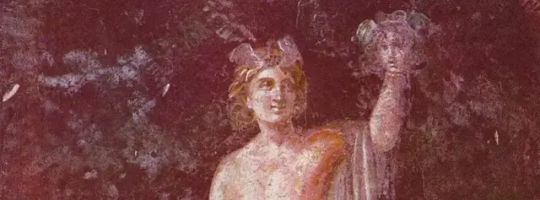
Der Medusa-Mythos in der Kurzübersicht
Medusa, Stheno und Euryale sind die drei Gorgonen und die Töchter der Meeresgötter Keto und Phorkys, die allerdings selbst Geschwister sind.
Ursprünglich galten die Gorgonen als entstellt und missgebildet. Im Laufe der Zeit hat sich das Bild der drei Schreckgestalten allerdings gewandelt.
Medusa, die als einzige der drei Geschwister sterblicher Natur ist, wird sogar eine betörende Schönheit zugeschrieben, die Männern den Kopf verdrehte.
Auch der Meeresgott Poseidon verliebte sich in sie, woraufhin sie von Athene beim Liebespiel ertappt wurden. Diese zürnte verwandelte Medusa in eine Schreckensgestalt.
Perseus, ein Held der griechischen Mythologie, verfolgte die Gorgo aufgrund eines Versprechens gegenüber Polydektes: er sollte, um seine Mutter Danaë vor den Avancen des Königs zu schützen, den Kopf der Medusa erbeuten.
Mit göttlicher Hilfe gelang es Perseus letzten Endes, das Medusenhaupt in seinen Besitz zu bringen. Allerdings endete seine Reise nicht mit der Flucht, sondern führte ihn noch zum Riesen Atlas und zu Andromeda, bevor er die traute Heimat erreichen sollte.
0 notes
Photo

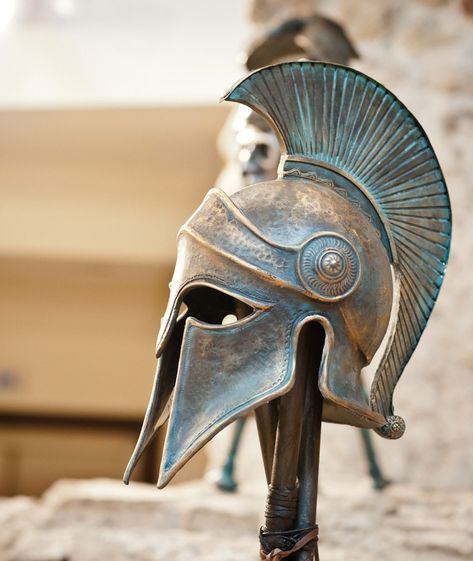

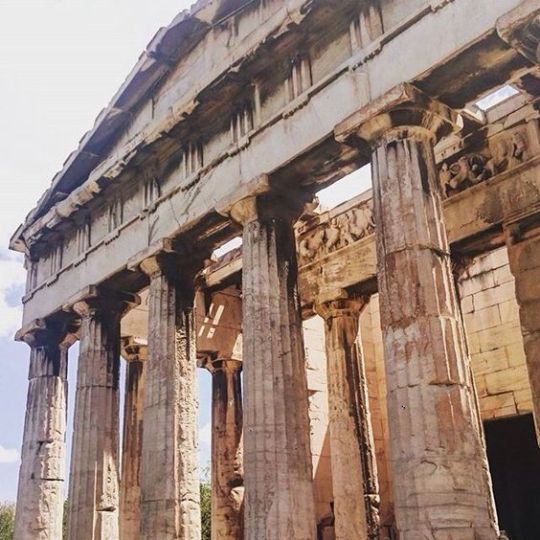
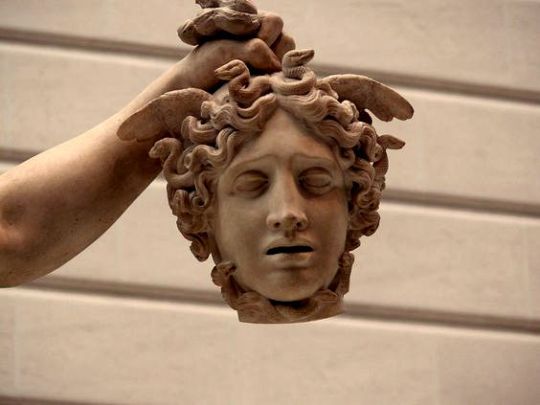
Περσευς
Perseus was one of the most celebrated heroes of Greek mythology.
He was the son of the Argive princess Danae who was locked away in a bronze chamber by her father Akrisios who lived in fear of a prophecy that he would one day be killed by her son. The god Zeus, however, infiltrated her prison in the guise of a golden shower and impreganted her. When Akrisios discovered the child, he placed the two in a chest and set them adrift at the sea. They were carried safely to the island of Seriphos where they were offered refuge by the kindly, fisherman Diktys.
When Perseus was fully grown, King Polydektes commanded he fetch the head of Medusa. With the help of the gods, Perseus obtained winged sandals, an invisible helm and a magical sword. He then sought out the ancient Graiai and stealing their single eye compelled them to reveal the location of the Gorgones. Perseus approached Medusa as she slept and beheaded her with eyes averted to avoid her petrifying visage.
On his journey back to Greece, Perseus came across the Ethiopian princess Andromeda chained to a rock as a sacrifice to a sea-monster. He slew the beast and brought her with him back to Greece as his bride.
Perseus was the ancestor of the royal houses of Mykenai, Elis, Sparta, Messenia, and distant Persia. His most famous descendant was Herakles.
#perseus#heroe#Greek Mythology#danae#akrisios#zeus#diktys#polydektes#medusa#graiai#gorgones#gorgon#greece#andromeda#mykene#herakles#myth#mythology#greek
425 notes
·
View notes
Text

The death of Akrisios (colour litho)
Thomas Ralph Spence (British, 1845-1918)
3 notes
·
View notes
Text
Perseus ve Medusa

Bir kahin, Argos kralı Akrisios’a, kızı Danae ’nin oğlu tarafından öldürüleceğini söylemiştir; bu da kralı kızını taliplerin meraklı gözlerinden uzakta bir yere kapamaya sürükler. Bu önleme rağmen, Zeus altından bir yağmur olarak gelip Danae yi hamile bırakır. Danae, Perseus u dünyaya getirdiği zaman ana-oğul Akrisios tarafından denize atılır, ama Seriphos adasına çıkmayı başarırlar.
Perseus…
View On WordPress
0 notes
Text




Prince Philokratis Akrisios
GENDER - Male
AGE - Child
Prince of Selinódasos
ASPIRATION - Artistic Prodigy
TRAITS: Sensitive, Language Savant
SIGN: Sagittarius
PARENTS - Laonome Amphytriona and King Akrisios I
PARTNER - None
CHILDREN - None
Download: Not available
Story: Once Upon A Time - The first ones
Family tree: The first ones
CHILD: He has the mind of an artist. He observes, he transforms, he recreate. Instinctively he processes his grief and loneliness to art. After the death of his mother he is a bit more silent, but a wonderful personality, he really is.
TODDLER: He still prefer his mother before anybody else, but then, she IS his mother, right? He already speaks two languages fluently which is amazing. And there seem to be quite a personality behind those innocent blue eyes.
INFANT: He is very attached to his mother, and he is a bit fearful of strangers. Hopefully it will change with time, because otherwise he will have a hard time as a royal person.
#Story character#Philokratis Akrisios#Generation 3#side character#Royal Family#Prince Philokratis#Once Upon A Time#Early Civilization#Royal family of Selinódasos#Prince of Selinódasos#KyriaT
0 notes
Text
Perseus und Medusa


Perseus & Medusa - Griechische Mythologie - Schild & Schwert
Perseus & Medusa - Griechische Mythologie - Schild & Schwert
Perseus war der Sohn des Zeus und der Menschenfrau Danaë. Da ein Orakel ihrem Vater Akrisios geweissagt hatte, sein Enkel werde ihn einmal töten, setzte er Danaë und den kleinen Perseus in einem Kasten auf dem Meer aus, um sie so umzubringen.
Zeus aber verhinderte dies, indem er sie auf der Insel Seriphos landen ließ, wo sie von König Polydektes aufgenommen wurden.
Als Perseus ein junger Mann geworden war, überredete ihn Polydektes zu einem besonderen Abenteuer: Er sollte ihm den Kopf der Medusa bringen, die ein gefürchtetes weibliches Ungeheuer mit Schlangenhaaren war.
Als sich der junge Mann Perseus auf die ihm vom König aufgetragene Arbeit vorbereitete, stand plötzlich die Göttin Athene vor ihm und sagte:
»Höre, junger Mann! Es gibt nur einen einzigen Weg zum Sieg. Suche zuerst die drei Schwestern der Medusa auf. Diese wohnen in den Bergen Afrikas. Sie besitzen ein gemeinsames Auge, das sie untereinander aufteilen. Wenn du ihnen dieses Auge raubst, werden sie dir den Weg zu Medusa zeigen. Nimm außerdem noch diesen Schild von mir, der wird dir von großem Nutzen sein!«
Nachdem sie diese Worte gesprochen hatte, schwang sich die Göttin wieder in die Lüfte und verschwand.
Als Perseus auf seiner Reise in Afrika angekommen war, traf er tatsächlich die drei Schwestern der Medusa. Wie Athene voraus gesagt hatte, wollten sie dem jungen Mann zuerst nicht helfen. Nachdem er ihnen aber das gemeinsame Auge geraubt hatte, gehorchten sie und erklärten Perseus bereitwillig den Weg zu Medusa.
Dennoch gab Perseus den Frauen das Auge nicht wieder zurück, sondern warf es in eine nahe liegende Quelle. So hatte er Vorsorge getroffen, dass die Schwestern der Medusa nicht gleich melden konnten, dass Perseus bald bei ihr eintreffen würde.
Wenig später begegnete der junge Mann einigen Nymphen. Diese sagten zu ihm: »Nimm diesen Rucksack, in dem du den Kopf der Medusa sicher bergen kannst.« Perseus danke ihnen und setzte seine Reise fort.
Bald darauf kam auch der Göterbote Hermes noch herbei. Dieser teilte ihm mit: »Ich bin in deinen Plan eingeweiht. Deshalb bringe ich dir dieses aus Silber gefertigte Schwert. Nimm auch diese beiden Flügelschuhe. Mit ihnen wirst du schnell zu Medusa gelangen. Wenn du aber die Höhle von Medusa betreten hast, hüte dich davor, sie anzublicken! Bis jetzt sind alle in Felsblöcke verwandelt worden, die sie direkt erblickt haben.«
Und schon flog Perseus mit Hilfe der Flügelschuhe schnell zu jener Küste, wo Medusa lebte. Nachdem er sie dort gefunden hatte, machte er alles so, wie es ihm zuvor geraten worden war, um jeglicher Gefahr zu entgehen.
Als er zur schlafenden Medusa vordrang, erinnerte er sich an die Mahnung des Hermes und näherte sich ihr, ohne sie direkt anzusehen. Dazu hielt er geschickt sein Schild gerade so, dass sich ihr Bild in ihm spiegelte.
Nachdem er die Medusa mit dem Schwert des Hermes getötet hatte, schnitt er ihr den Kopf ab und barg diesen im mitgebrachten Rucksack der Nymphen. Als er sich aber dann wieder in die Luft erhob, um in die Heimat zurückzukehren, traten plötzlich heftige Windböen auf, die ihn in das Königreich des Atlas trieben.
Perseus bat den mächtigen König um Unterkunft und äußerte die Bitte , dass er eine Nacht in dessen Haus übernachten dürfe. Als er aber von Atlas abgewiesen wurde, antwortete Perseus voller Zorn: »Da du mir eine Unterkunft verweigerst und das Gastrecht verletzt hast, erhälst du von mir ein gerechtes Geschenk.«
Nachdem er diese Worte gesprochen hatte, nahm er den Kopf der Medusa aus dem Rucksack und zeigte ihn dem König Atlas, der sofort in einen großen Berg verwandelt wurde.
Perseus & Medusa - Griechische Mythologie - Schild & Schwert
Read the full article
0 notes
Text
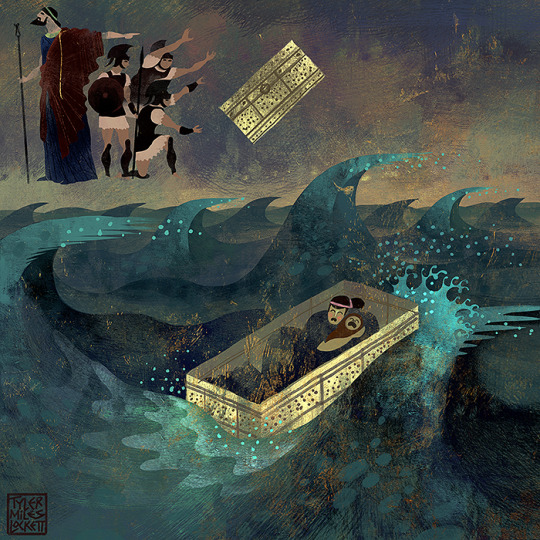
Castaways (#2 in my Quest for the Gorgon head series)
After the miracualous conception, Danae gives birth to a demi-god son she names Perseus. King Akrisios, not believing the child to have been born of Zeus, and to punish her, places her and the child into a chest and casts them into the sea. the pair find safe passage to the shore of Seriphos. Here they are rescued upon the coast by a fisherman, Diktys, who raises Perseus. But Diktys brother is king Polydektes, who, becoming enamoured with Danae, seeks to remove the protective Perseus from his path of desire.
What I find fascinating about this plot point is it being an early example of the "child surviving sure death to fulfill destiny as the chosen one" archetype. From the Book of Exodus (600 B.C.) we have a similar structure of abandonment, rescue from water, and adoption by royalty. In Ancient Egypt, the Pharaoh ordered the slaughter of Israelite children, so Moses' mother placed him within a basket, and cast him off into the Nile, to later be discovered and adopted by the Egyptian royal family.
It also brings to mind another similar structure used by Sophocles in his famous tragedy "Oedipus Rex." (429.B.C.) Queen Jocasta, hearing a prophecy that her son will kill his father (her husband) gives the baby away to a shepherd to leave out exposed on a mountain side, but the shepherd saves the baby's life, thus allowing Odepis to live on to fulfill the prophecy. But that's a tale for another time.
Like this art? It will be in my illustrated book with over 130 other full page illustrations coming in June to kickstarter. to get unseen free hi-hes art subscribe to my email newsletter
Follow my backerkit kickstarter notification page.
Thank you for supporting independent artists! 🤘❤️🏛😁
#greekmythology#greekgods#pjo#mythology#classics#classicscommunity#myths#ancientgreece#classicliterature#classicnovels#tylermileslockett#greekmyths
45 notes
·
View notes
Text
Perseus looking almost completely like his mother.
Perseus' colouring being actually not very much like either Zeus or Danae, because the gold rain affected his complexion/colouring. (Though, if you imagine Zeus as blond, he'd share that with his father.) But it's undeniable that he is Danae's son.
(And Zeus', for those who know how to look, but that's not the point.)
Because, you see, Akrisios is supposed to be killed by his grandson. His daughter's son.
And maybe it's merely chance, natural providence, or maybe it's Fate having a laugh, for how hard and cruelly he tried to avoid it, but Perseus looks so very much like his mother. Akrisios will know his death is coming for him when he sees the boy.
(And despite that Perseus surely has some cause to take witting revenge for his mother's treatment, Akrisios dies by accident at his grandson's hand. Makes you wonder how things might have gone if he hadn't locked his daughter up in an isolated prison with only one other person for company.)
#greek mythology#perseus#acrisius#you know this is another reason#why I just CANNOT fucking fathom#people making Perseus out to be a villain#yeah Oidipous kills his father unwittingly too#but with intent!#Perseus doesn't even do that!
4 notes
·
View notes
Photo

Argos kralı Akrisios’un en büyük derdi kendinden sonra tahtını bırakabileceği bir erkek evladının olmamasıdır. Kralın tek çocuğu bir zamanlar amcasıyla gizli aşk yaşayan Danae’dir. Akrisios derdine çare bulmak için bir kahine başvurur. Kahin ise onun hiçbir zaman erkek çocuğa sahip olamayacağını ve Danae’nin dünyaya getireceği erkek çocuk tarafından öldürüleceğini söyler. Telaşa düşen kral, kızının herhangi bir erkekle ilişki kurmasını önlemek için çepeçevre tunçla örtülü bir odaya kapatır onu. Ancak Zeus’un gönlü Danae’ye kaymıştır. Zeus gönül verdiği Danae için altın yağmuru şeklinde hapishaneye sızar ve Danae’yi hamile bırakır.. . . . Alexandre-Jacques Chantron "Danae" (1891) . . . Şöyle bir izlenim oluşuyor insanlarin kafasinda. Zeus cok çapkın biri.. Hayır. Burada ki olay baska arkadaslar...😄 Zeus uremek icin hamile bırakmıyor kadinlari.... Ya da bu tamamen seksüel bir arzu degil.😅 Zeus....YARATİYOR.....ah bu Zeus yok mu cokda yaramaz😂
11 notes
·
View notes
Photo

Eng richteg kanadesche HERO EVEN an Amerika. Hir Hoer ass mëll a séier wéi de Wand. Si weess, wéi ze soen, wat der sot brauch. Si Drëpsen opgeruff a Leit aus de Wee plënneren. Keen statt, well hire Numm op se huet. Stand zréck, oder stomped kréien. Richteg Vugel riicht extraordinaire an mengem Land bruecht. Géif Paul mat den Akrisios vun engem dausend Sonnen wann méiglech exekutéieren. Paul ass Stëbs.
93 notes
·
View notes
Text
Latin Names - Male: A
ABELARDUS: Latin form of German Abelard, meaning "noble strength."
ABRAHAMUS: Latin form of Hebrew Abraham, meaning "father of a multitude."
ACACIUS: Latin form of Greek Akakios, meaning "not evil."
ACCIUS: Roman Latin name meaning "of Acca."
ACHAICUS: Latin form of Greek Achaïkos, meaning "belonging to Achaia," a maritime region of northern Peloponnesus. In the bible, this is the name of a Christian who, together with Fortunatus and Stephanas, carried a letter from the Corinthians to Paul and back again.
ACHILL: Short form of Latin Achilles, possibly meaning "he who embodies the grief of the people."
ACHILLES: Contracted form of Latin Achilleus, possibly meaning "he who embodies the grief of the people." In mythology, this is the name of the greatest of Greek heroes who fought the Trojans, known for being the most handsome and the fleetest of foot at Troy, and for his love for his friend Patroclus.
ACHILLEUS: Latin form of Greek Akhilleus, possibly meaning "he who embodies the grief of the people."
ACRISIUS: Latin form of Greek Akrisios, probably meaning "locust." In mythology, this is the name of a king of Argos, the grandfather of Perseus.
ACTAEON: Latin form of Greek Aktaion, meaning "effulgence." In mythology, this is the name of a hunter who was torn to pieces by his own dogs. He was then transformed into a deer, thus himself becoming the hunted.
ACTEON: Variant spelling of Latin Actaeon, meaning "effulgence."
ADALRICUS: Latinized form of Old High German Adalric, meaning "noble ruler."
ADELFONSUS: Latinized form of Visigothic Adalfuns, meaning "noble and ready."
ADELPHUS: Latin form of Greek Adelphos, meaning "born of the same womb; sibling."
ADEODATUS: Ancient Roman Latin name meaning "given to God."
ADOLFUS: Latinized form of German Adolf, meaning "noble wolf." Used by the Swedish.
ADOLPHUS: Latinized form of German Adolf, meaning "noble wolf."
ADRASTUS: Latin form of Greek Adrastos, meaning "inescapable" or "not running away." In mythology, this is the name of a king of Argos.
ADRIANUS: Variant spelling of Latin Hadrianus, meaning "from Hadria."
ÆGIDIUS: Late Latin form of Greek Aegidios, meaning "kid; young goat" or "shield of goatskin."
ÆLIA: From Roman Ælianus, meaning "solar." This name is part of a puzzling alchemical inscription (Ælia Lælia Crispus) supposedly found in Bologna, which some have theorized is a representation of two beings, Ælia and Lælia, who are united in a single subject, Crispus "curly," with Ælia being "solar" from helios and Lælia being "lunar," while Crispus, a combination of both, is the basic substance (obvoluta intricata) from which all life was made, thus "curly," in reference to the hair of gossamer dryads which were said to be neither man nor woman but hermaphroditic.
ÆLIANUS: Roman family name, derived from Greek helios, meaning "sun."
ÆMILIANUS: A derivative of Roman Latin Æmilius, meaning "rival."
ÆMILIUS: Ancient Roman Latin name, meaning "rival."
AENEAS: Latin form of Greek Aineías, meaning "praiseworthy." In mythology, this is the name of a Trojan warrior who founded the Roman state.
ÆOLUS: Latin form of Greek Aiolos, meaning "sparkling; quick-shifting; quick-moving." In mythology, this is the name of a god of winds.
ÆSCHYLUS: Latin form of Greek Aischylos, meaning "shame."
ÆSON: Latin form of Greek Aison, possibly meaning "to be" or "that which is made." In mythology, this is the name of Jason's father.
ÆSOP: Latin form of Greek Aisopos, the name of the author of Æsop's Fables, said to be a Greek hump-backed slave of African descent; therefore, the name has taken on the meaning "hump-backed," but in Greek it means "Ethiop."
ÆTHER: Latin form of Greek Aither, meaning "bright, upper air." In mythology, this is the name of one of the first gods, the son of Erebus and Nyx. He is the god of the pure, upper air that only the gods breathe, as opposed to the gloomy, lower "aer" breathed by mortals.
ÆTIUS: Roman name derived from the Greek word ætos, meaning "eagle."
AGAPETUS: Latin form of Greek Agapetos, meaning "beloved."
AGAPITUS: Latin form of Greek Agapetos, meaning "beloved."
AGAPIUS: Latin form of Greek Agapios, meaning "divine love."
AGATHANGELUS: Latin form of Greek Agathangelos, meaning "good angel."
AGRIPPA (Агриппа): Latin form of Greek Agrippas, meaning "wild horse." In the New Testament bible, this is the name of the Herod Agrippa who ordered the execution of the apostle James, and the imprisonment of Peter. Compare with feminine Agrippa.
AHASUERUS (אֲחַשְׁוֵרוֹש): Latin form of Greek Xerxes, meaning "great warrior" or "lion-king." In the bible, this is the name of a king of Persia. His Hebrew name is Achashverosh.
AIGIDIUS: Latin form of Greek Aigidios, meaning "kid; young goat" or "shield of goatskin."
AIOLUS: Latin form of Greek Aiolos, meaning "sparkling; quick-shifting; quick-moving." In mythology, this is the name of the god of winds.
AJAX: Latin form of Greek Aias, meaning "mourner." In mythology, this is the name of a hero of the Trojan war, second only to Achilles in strength and bravery. He was also known as Telamonion Ajax (Ajax, son of Telamon), Greater Ajax, and Ajax the Great.
ALAIR: Latin form of French Alaire, meaning "joyful; happy."
ALARICUS: Latinized form of Visigothic Alaric, meaning "all-powerful; ruler of all."
ALBANUS: Latin family name meaning "like Albus," i.e. "white." It is related to the place name Alba which comes from the Celtic word Albion, used to refer to the whole island of Great Britain.
ALBERIC: Short form of Latin Albericus, meaning "elf ruler."
ALBERICUS: Latin form of German Alberich, meaning "elf ruler."
ALBERTUS: Latin form of Old High German Adalbert, meaning "bright nobility."
ALBINUS: Variant spelling of Roman Latin Albanus, meaning "like Albus," i.e. "white."
ALBUS: Latin name derived from the word albus, meaning "white, pale-skinned."
ALCAEUS: Latin form of Greek Alkaios, meaning "strength." In Greek mythology, this is the name of several characters, including a son of Perseus.
ALCANDER: Latin form of Greek Alkandros, meaning "strong." In mythology, this is the name of the man who chased the lawgiver Lycurgus out of a marketplace and put out one of his eyes.
ALCIMUS: Latin form of Greek Álkimos, meaning "valiant." In mythology, this is the name of the father of Mentor.
ALCINDER: Variant spelling of Latin Alcander, meaning "strong."
ALERIO: Latin name derived from the word alario, meaning "eagle."
ALEXANDRUS: Latin form of Greek Alexandros, meaning "defender of mankind."
ALEXIS: Unisex contracted form of Latin Alexius, meaning "defender."
ALEXIUS: Latin form of Greek Alexios, meaning "defender."
ALEXUS: Unisex contracted form of Latin Alexius, meaning "defender."
ALFONSUS: Latin form of Visigothic Adalfuns, meaning "noble and ready."
ALFREDUS: Variant spelling of Latin Alvredus, meaning "elf counsel."
ALMERICUS: Variant spelling of Latin Amaliricus, a form of Old German Amaliric, meaning "work-power."
ALOISIUS: Variant spelling of Latin Aloysius, meaning "famous warrior."
ALOYSIUS: Latin form of French Provençal Aloys, meaning "famous warrior."
ALPHAEUS: Latin form of Greek Halphaios, meaning "changing." In the bible, this is the name of the fathers of James and Levi.
ALPHEAUS: Variant spelling of Latin Alphaeus, meaning "changing."
ALPHEUS: Variant spelling of Latin Alphaeus, meaning "changing."
ALPHOEUS: Variant spelling of Latin Alphaeus, meaning "changing."
ALPHONSUS: Latin form of Visigothic Adalfuns, meaning "noble and ready."
ALPHONZUS: Variant spelling of Latin Alphonsus, meaning "noble and ready."
ALVINIUS: Latin form of Old High German Alwin, meaning "elf friend."
ALVREDUS: Latin form of Anglo-Saxon Ælfræd, meaning "elf counsel."
AMADEUS: Roman Latin name used by Mozart as a pen name, composed of the elements amare "to love" and Deus "God," hence "to love God."
AMALIRICUS: Latinized form of Old German Amaliric, meaning "work-power." This name is the source of many modern names; even the name America may have derived from it.
AMANDUS: Latin name derived from the word amanda, meaning "lovable."
AMANTIUS: Roman Latin name meaning "loving."
AMARANDUS: Latin form of Greek Amarandos, meaning "unfading."
AMARANTHUS: Latin form of Greek Amaranthos, meaning "unfading."
AMATUS: Latin form of French Amé, meaning "beloved."
AMBROSIANUS: Roman name derived from Latin Ambrosius, meaning "immortal."
AMBROSIUS: Latin form of Greek Ambrosios, meaning "immortal."
AMEDEUS: Variant spelling of Latin Amadeus, meaning "to love God."
AMERICUS: A derivative of Latin Amaliricus, meaning "work-power."
AMLETHUS: Latin form of Anglo-Saxon Amleþ, possibly meaning "heavy" or "the dullard."
AMLETUS: Either a Latin form of Old French Hamelet "tiny little village," or a variant spelling of Latin Amlethus, possibly meaning "heavy" or "the dullard."
AMOR: Latin name meaning "love." In Roman mythology, this is an epithet applied to Cupid.
AMPELIUS: Latin form of Greek Ampelios, meaning "vine."
AMPHION: Latin form of Greek Amphiōn, probably meaning "moving double" or "moving on both sides." In mythology, this is the name of a son of Zeus and Antiope.
ANACLETUS: Latin form of Greek Anakletos, meaning "called back; invoked."
ANASTASIUS: Latin form of Greek Anastasios, meaning "resurrection."
ANASTATIUS: Variant spelling of Latin Anastasius, meaning "resurrection."
ANASTIUS: Contracted form of Latin Anastasius, meaning "resurrection."
ANATOLIUS: Latin form of Greek Anatolios, meaning "east" and "sunrise."
ANDROCLES: Latin form of Greek Androkles, meaning "glory of a man/warrior."
ANDRONICUS: Latin form of Greek Andronikos, meaning "victory of a man/warrior." This is the name of many Byzantine and Trebizond emperors.
ANENCLETUS: Variant spelling of Latin Anacletus, meaning "called back; invoked."
ANGELICUS: Latin name derived from the word angelicus, meaning "angelic."
ANGELUS: Latin form of Greek Angelos, meaning "angel, messenger."
ANICETUS: Latin form of Greek Aniketos, meaning "unconquerable."
ANTIGONUS: Latin form of Greek Antigonos, meaning "against the ancestor."
ANTIPATER: Latin form of Greek Antipatros, meaning "like the father."
ANTONINUS: Roman name derived from older Latin Antonius, possibly meaning "invaluable."
ANTONIUS: Latin form of Greek Antonios, possibly meaning "invaluable."
APHRODISIUS: Latin form of Greek Aphrodisios, meaning "risen from the foam."
APOLLINARIS: Ancient Roman Latin name meaning "of Apollo."
APOLLO: Latin form of Greek Apollon, probably meaning "destroyer." In Greek mythology, this is the name of a god of archery, healing, light, poetry, prophecy, music, and the sun. He is the son of Zeus and Leto, and the twin brother of Artemis, goddess of the hunt and moon.
APOLLONIUS: Latin form of Greek Apollonios, meaning "of Apollo."
APPIUS: Latin Praenomen of several Romans, including Appius Claudius Sabinus Inregillensis, the founder of the clan of Claudia. He was born Attius Clausus, and became consul of Rome in 495 BCE. According to Livy, in his History of Rome, Appius was "harsh by nature," having an "innate love of tyranny." The clan name Appius/Attius may be related to the name of the eunuch god Attis, meaning "Papa."
AQUILA: Roman Latin name meaning "eagle." In the New Testament bible, this is the name of a Jew of Pontus and ally of Paul.
ARCADIUS: Latin form of Greek Arkadios, meaning "of Arcadia." The place name Arcadia was derived from the word arktos, meaning "bear."
ARCHELAUS: Latin form of Greek Archelaos, meaning "master of the people." In the bible, this is the name of a son of Herod the Great.
ARCHIPPUS: Latin form of Greek Archippos, meaning "master of horses."
ARGUS: Latin form of Greek Argos, meaning "bright, shining" and "swift." In mythology, this is the name of a giant who had a hundred eyes that were transferred to the peacock's tail after his death. This was also the name of Ulysses' dog who waited ten years for his return from the Trojan War.
ARIES: Latin name meaning "ram." The ram in the Aries constellation is probably the same ram from Greek mythology whose golden fleece was the quest of Jason and the Argonauts.
ARISTAEUS: Latin form of Greek Aristaios, meaning "excellence." In mythology, this is the name of the son of Apollo and a mortal woman. He was raised on ambrosia and made immortal by Gaia.
ARISTARCHUS: Latin form of Greek Aristarchos, meaning "best ruler." In the bible, this is the name of a companion of Paul. It is also the name of an asteroid and a crater on the Moon.
ARISTIDES: Latin form of Greek Aristeides, meaning "best physique."
ARISTOBULUS: Latin form of Greek Aristoboulos, meaning "best-counseling." In the bible, this is the name of a certain Christian.
ARISTOCLES: Latin form of Greek Aristokles, meaning "best glory."
ARISTODEMUS: Latin form of Greek Aristodemos, meaning "best of the people."
ARISTOTLE: Latin form of Greek Aristoteles, meaning "best purpose."
ARMINIUS: Latin form of German Hermann, meaning "army man." This name was borne by the Teutonic national leader Arminius the Cheruscan, mentioned by Tacitus.
ARNOLDUS: Latin form of Frankish German Arnwald, meaning "eagle power."
ARSENIUS: Latin form of Greek Arsenios, meaning "virile."
ARTEMIDORUS: Latin form of Greek Artemidoros, meaning "gift of Artemis."
ARTEMISIUS: Latin form of Greek Artemisios, meaning "safe and sound."
ARTORIUS: Latin form of Celtic Arthur, possibly meaning "bear-man." This is the first recorded form of Arthur's name that has been found.
ASCLEPIUS: Latin form of Greek Asklepios, possibly meaning "surgeon." In mythology, this is the name of a demigod who learned the secret of life and death from a serpent.
ATHAMUS: Latin form of Greek Athamas, meaning "rich harvest." In mythology, this is the name of the father of Phrixus.
ATHANASIUS: Latin form of Greek Athanasios, meaning "immortal."
ATILIUS: Variant spelling of the Roman Latin family name Attilius, possibly meaning "father."
ATTICUS: Roman Latin name meaning "from Attica."
ATTILIUS: Roman Latin family name, possibly ultimately from Teutonic Atta, meaning "father."
ATTIUS: From Roman Latin Attilius, possibly meaning "father."
AUGUST: Short form of Latin Augustus, meaning "venerable." In use by the English and Germans.
AUGUSTINUS: From Roman Latin Augustus, meaning "venerable."
AUGUSTUS: Ancient Roman Latin name meaning "venerable." Originally a title borne by the first Roman emperor, Octavian.
AULUS: Roman name, possibly derived from Etruscan Aule which is, unfortunately, of unknown meaning. Some sources connect it with Latin aula/olla, meaning "palace."
AURELIANUS: From Roman Latin Aurelius, meaning "golden."
AURELIUS: Roman name derived from Latin aureus, meaning "golden."
AURIEL: Latin name meaning "gold" or "golden."
AVITUS: Ancient Roman name meaning "ancestral."
0 notes